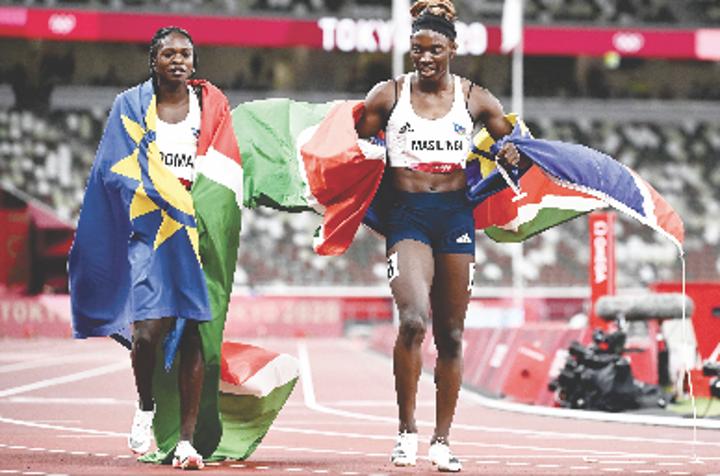Africa-Press – Namibia. NAMBIA’s superstar sprinters Christine Mboma and Beatrice Masilingi will have to lower their testosterone levels or quit competing locally and on the global stage.
This comes after a new hurdle was placed in the way of them racing internationally – suppressing their testosterone levels for the next six months to be allowed to compete in World Athletics-sanctioned events.
As it stands, the 19-year-olds are ruled out of this year’s World Championships set for August in Budapest, Hungary, and are also not permitted to take part in the Diamond League.
Mboma’s camp indicated that “she still wants to compete”.
Mboma, who won silver in the 200 metres at the 2021 Tokyo Olympics, has the ability to overcome the new restrictions, her representatives say.
“The news was a shock to Christine, but she is positive through the negativity, and ready to take on this challenge to ensure that she represents Namibia at the highest level,” Mboma’s management said in a statement on Friday.
Her coach, Henk Botha, however, told BBC Sport that like South Africa’s Caster Semenya, who was one of the original targets of World Athletics’ testosterone rules, they would consider all options, including legal action.
“The rumours were running through the whole [of] Europe, and some of the people were telling me this is coming. World Athletics haven’t contacted anybody.
“For us this is an obstacle – not the end,” Botha said.
“Challenging World Athletics in the court, obviously, is expensive and a long thing . . .
“It’s time for the world to stand up against things like this and the way this has been handled.”
Masilingi’s representatives, Newton Sport Agency, says they “are awaiting official correspondence regarding the new rulings, and will only be able to comment once received”.
Masilingi was expected to run at Athletics Namibia Senior National T&F Championships in Windhoek next month.
Mboma, whose anticipated season debut was to be the Kip Keino Classic in Nairobi at the end of May, remains “positive” despite the news and continues to train in anticipation of competition, her camp says.
“Christine knows about the updated rules and we’ve discussed it. She’s positive and we will keep training,” her management says.
World Athletics classifies the Namibian stars as athletes with differences in sex development (DSD) who naturally produce high levels of testosterone.
Under the new rules, DSD athletes will be required to reduce their blood-testosterone level to below 2,5 nanomoles per litre – half of the previously accepted level of five nanomoles.
Athletes must also remain under this threshold for two years to compete internationally in the female category in any track-and-field event.
Previously, DSD athletes were required to lower their testosterone levels to compete in women’s events between 400m and a mile, forcing Mboma and Masilingi to forego their specialist 400m event and drop down to shorter sprints.
The limitation will be applied to all track disciplines from 1 April.
‘UNKNNOWN HEALTH CONSEQUENCES’
Other high-profile athletes affected by the new regulations are South Africa’s decorated middle-distance runner Caster Semenya, Francine Niyonsaba of Burundi, Mary Wambui of Kenya and Niger’s Aminatou Seyni.
Semenya says taking hormone suppressants has “unknown health consequences”.
The South African superstar, who burst onto the athletics scene in 2009 when she won the women’s 800m world title by a significant margin, was forced to do so between 2010 and 2015.
“It made me sick, made me gain weight, [have] panic attacks, I didn’t know if I was going to have a heart attack,” Semenya said in a 2022 interview with HBO’s Real Sports.
Uganda’s Annet Negesa, the winner of the 800m in the African Games, was reportedly never the same after the far-reaching consequences of surgery to reduce her naturally high testosterone levels before the 2012 Olympic Games in London.
She subsequently became very sick and thought she would die, she says.
Today she suffers joint pain and related issues, she said in a documentary by German broadcaster ARD in September 2019.
In 2021, the excellent Namibian pair were given the option to take hormones to lower their testosterone levels after a breakthrough season, or to run in events other than 400m and the mile.
They continued to shine after dropping down to the 200m just before the 2020 Tokyo Olympics, where Mboma won a silver medal, and Masilingi placed sixth in a historic race for Namibia.
In 2020, Semenya lost her appeal to the Swiss Federal Tribunal to set aside a 2019 Court of Arbitration for Sport (CAS) ruling that intersex women with naturally high testosterone levels must take medication to reduce their testosterone levels.
World Athletics claims to have over 10 years of research and evidence of the physical advantages these athletes bring to the female category.
The new regulations are meant to “maintain fairness for female athletes “ and are “guided” science, World Athletics president Sebastian Coe said when announcing the developments.
World Athletics also banned male-to-female transgender athletes from women’s competitions on Thursday.
However, a working group will be set up for 12 months to further consider the issue of transgender inclusion.
“As more evidence becomes available, we will review our position, but we believe the integrity of the female category in athletics is paramount,” Coe said.
HUMAN RIGHTS
In 2019, the United Nations Human Rights Council (UNHCR) said forcing female athletes to regulate testosterone could breach international human rights rules.
It called on all countries to ensure sport organisations “refrain from developing and enforcing policies and practices that force, coerce or otherwise pressure women and girl athletes into undergoing unnecessary, humiliating and harmful medical procedures”.
For More News And Analysis About Namibia Follow Africa-Press






